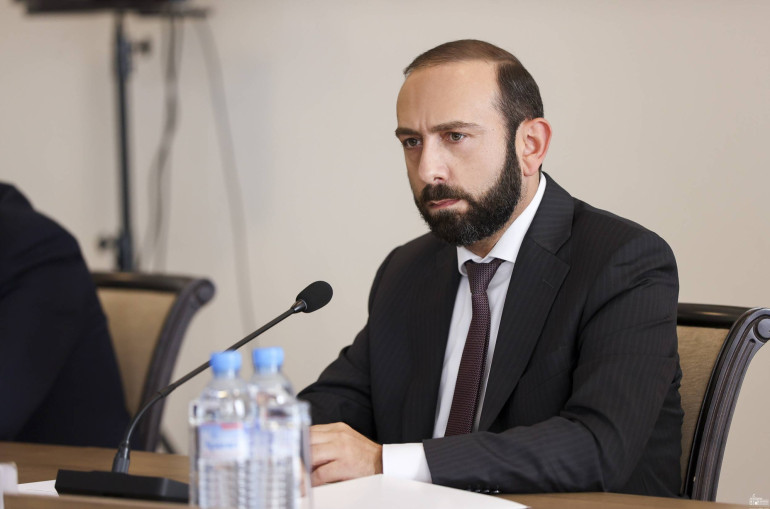Remarks by Armenia’s Foreign Minister Ararat Mirzoyan at the 42nd session of the UNESCO General Conference
Madame President of the General Conference,
Madame Chair of the Executive Board,
Madame Director-General,
Excellences,
Distinguished Delegates,
At the outset, I would like to congratulate H.E. Ms. Simona-Mirela Miculescu on her election as President of the 42nd session of the General Conference, and wish every success in her responsible mission. I also want to express my sincere appreciation to H.E. Mr. Irazabal Mourao for his excellent work during his tenure as President of the 41st session of the General Conference.
Madam President,
The persistent challenges that the world faces today, ranging from armed conflicts to the impacts of climate change, underscore the imperative to redouble our joint efforts in all the fields of competence of UNESCO.
Therefore, we support UNESCO’s future strategic orientations and programmatic priorities, in particular in the field of right to education for all, cultural rights, freedom of expression, and the fight against racism, discrimination, intolerance and hate speech.
As a member of the Executive Board, Armenia will further contribute to the successful implementation of programs in favour of the Global Priorities Africa and Gender Equality, as well as priority groups – Youth and Small Island Developing States.
As a co-chair of the Group of Friends of Small Island Developing States, we will continue to support the implementation of Operational Strategy to address the systemic vulnerabilities of this group of states.
Armenia stands firmly behind UNESCO’s endeavors to protect cultural heritage, especially in the regions affected by conflicts and natural disasters and condemns any attacks on cultural symbols due to their diverse origins or identities.
In this regard, Armenia reiterates its commitment to further contribute to the restoration of Iraqi documentary heritage in the framework of UNESCO’s flagship initiative “Revive the spirit of Mosul”.
2024 marks the 70th anniversary of the 1954 Hague Convention and this landmark occasion creates an important momentum for renewing the commitment of the international community for protection of cultural property during armed conflicts. Armenia stands ready to contribute to observation of this important anniversary.
Madam President,
Amid our shared struggle to maintain the fragile peace in various corners of the world, while promoting the values of living together, it is with deep concern that I draw your attention to the dire situation in our region.
The 10 month-long blockade of Nagorno-Karabakh by Azerbaijan, humanitarian crisis, absence of food, medicine, gas and electricity supplies and, as a culmination, the large-scale military offensive and indiscriminate targeting of the civilian population and infrastructure resulted in forcible displacement and ethnic cleansing of the entire indigenous Armenian population of Nagorno-Karabakh, leaving behind their homes, shrines and the millennia-old cultural and religious heritage.
Armenia is currently facing a massive influx of more than 100 000 refugees from Nagorno-Karabakh, among them 30 thousand children, who fled their ancestral homeland in just a few days, under the fear of persecution and atrocity crimes. The Government of Armenia, in cooperation with the international organizations and partner states, has undertaken a number of measures to address the life-saving, protection and early recovery needs of the refugees. In this regard, I wish to extend Armenia’s gratitude to the UNESCO and its Director-General for the rapid deployment of the UNESCO emergency mission to Armenia for the assessment of educational needs of refugee children.
With regard to the cultural and religious heritage left in Nagorno-Karabakh, its protection from vandalism and looting is crucial. Since the fall of 2020 the Republic of Armenia has consistently alerted the international community on Azerbaijan’s state-led policy of destruction, desecration and appropriation of the vast religious and cultural heritage in and around Nagorno-Karabakh.
The legally binding order on the Provisional Measures issued by the International Court of Justice on 7 December 2021, compels Azerbaijan to “take all necessary measures to prevent and punish acts of vandalism and desecration affecting Armenian cultural heritage, including but not limited to churches and other places of worship, monuments, landmarks, cemeteries and artefacts”.
Deployment of UNESCO’s independent fact-finding mission to Nagorno-Karabakh with the view of independent monitoring and mapping of the Armenian cultural heritage is a key prerequisite to prevent destruction or distortion of the Armenian cultural property, as was the case with the complete annihilation of the Armenian cultural heritage in Nakhijevan between 1997-2006.
In conclusion, I would like to stress Armenia’s unwavering support to the Organization in its efforts to foster a culture of peace and tolerance anchored on upholding and promoting human rights.
Thank you.















